Tackling Neglected and Abused in Health and Social Care Settings
VerifiedAdded on 2023/01/11
|13
|4643
|54
AI Summary
This report explores the purpose and processes of conducting research in health and social care, including the skills and qualities needed to conduct a literature review. It also discusses the benefits of evidence-based practice and provides guidance on developing a project proposal. The report addresses the issues of neglect and abuse in health and social care settings and suggests ways to tackle them. The case study of Angela Coleman, a former cancer patient, is used to illustrate the importance of evidence-based practice in improving care.
Contribute Materials
Your contribution can guide someone’s learning journey. Share your
documents today.
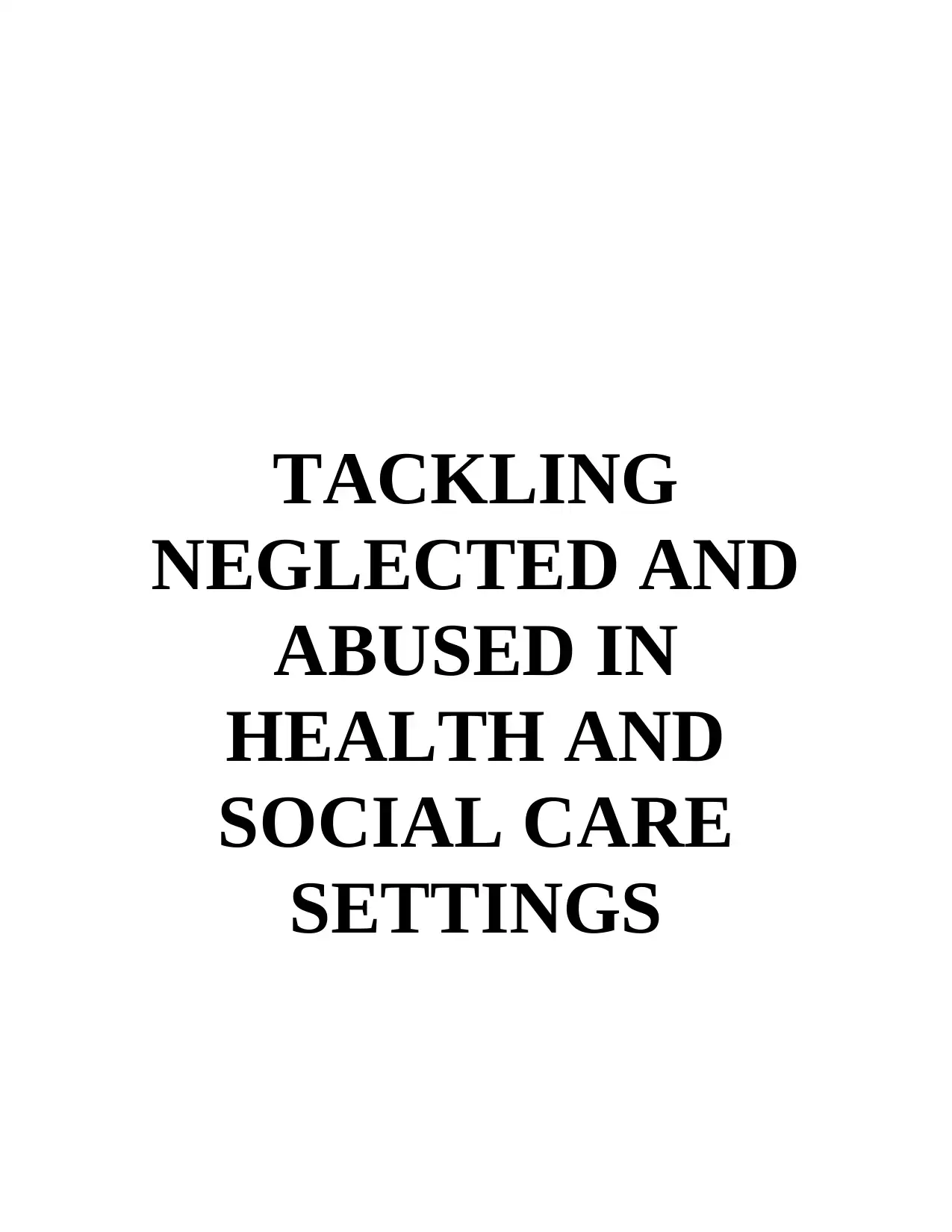
TACKLING
NEGLECTED AND
ABUSED IN
HEALTH AND
SOCIAL CARE
SETTINGS
NEGLECTED AND
ABUSED IN
HEALTH AND
SOCIAL CARE
SETTINGS
Secure Best Marks with AI Grader
Need help grading? Try our AI Grader for instant feedback on your assignments.
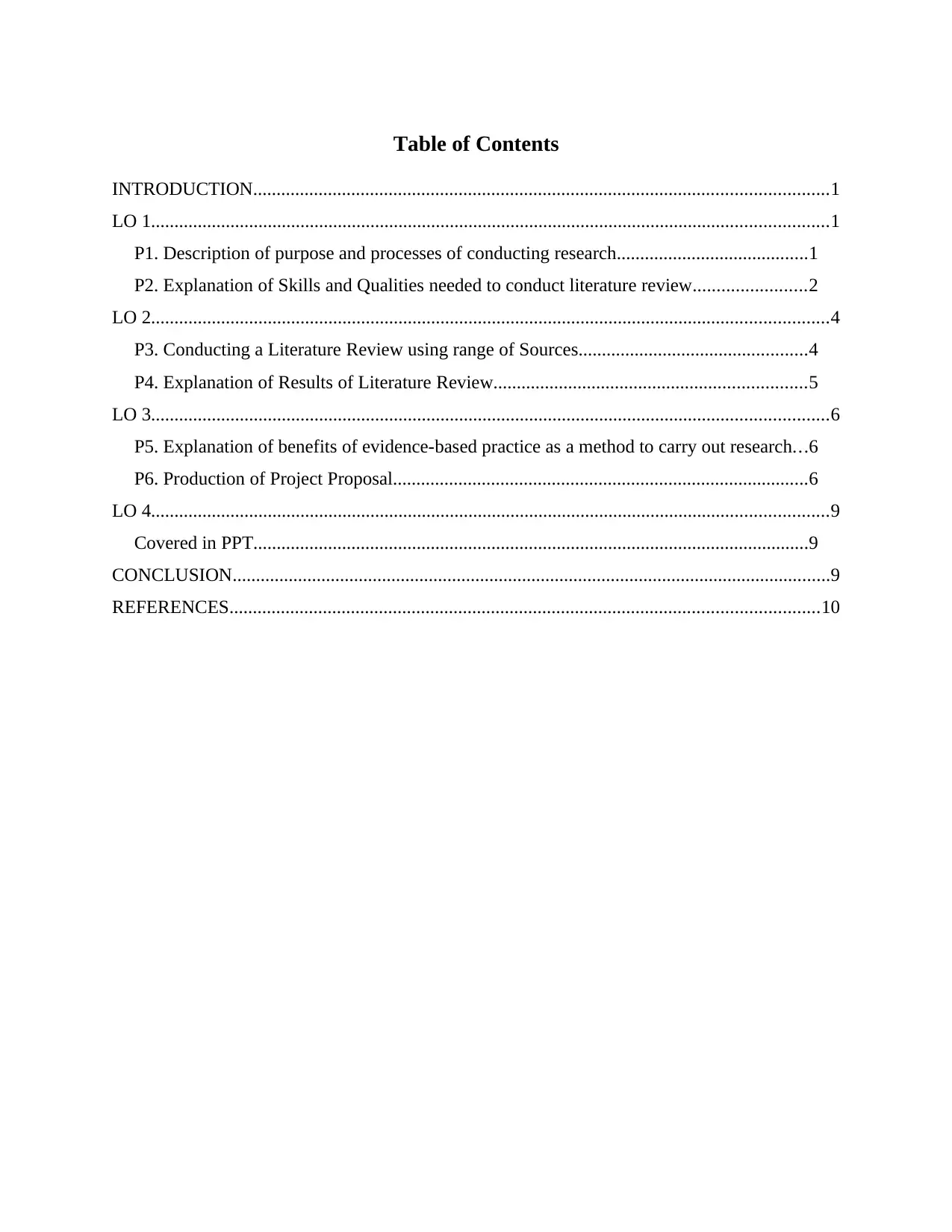
Table of Contents
INTRODUCTION...........................................................................................................................1
LO 1.................................................................................................................................................1
P1. Description of purpose and processes of conducting research.........................................1
P2. Explanation of Skills and Qualities needed to conduct literature review........................2
LO 2.................................................................................................................................................4
P3. Conducting a Literature Review using range of Sources.................................................4
P4. Explanation of Results of Literature Review...................................................................5
LO 3.................................................................................................................................................6
P5. Explanation of benefits of evidence-based practice as a method to carry out research...6
P6. Production of Project Proposal.........................................................................................6
LO 4.................................................................................................................................................9
Covered in PPT.......................................................................................................................9
CONCLUSION................................................................................................................................9
REFERENCES..............................................................................................................................10
INTRODUCTION...........................................................................................................................1
LO 1.................................................................................................................................................1
P1. Description of purpose and processes of conducting research.........................................1
P2. Explanation of Skills and Qualities needed to conduct literature review........................2
LO 2.................................................................................................................................................4
P3. Conducting a Literature Review using range of Sources.................................................4
P4. Explanation of Results of Literature Review...................................................................5
LO 3.................................................................................................................................................6
P5. Explanation of benefits of evidence-based practice as a method to carry out research...6
P6. Production of Project Proposal.........................................................................................6
LO 4.................................................................................................................................................9
Covered in PPT.......................................................................................................................9
CONCLUSION................................................................................................................................9
REFERENCES..............................................................................................................................10
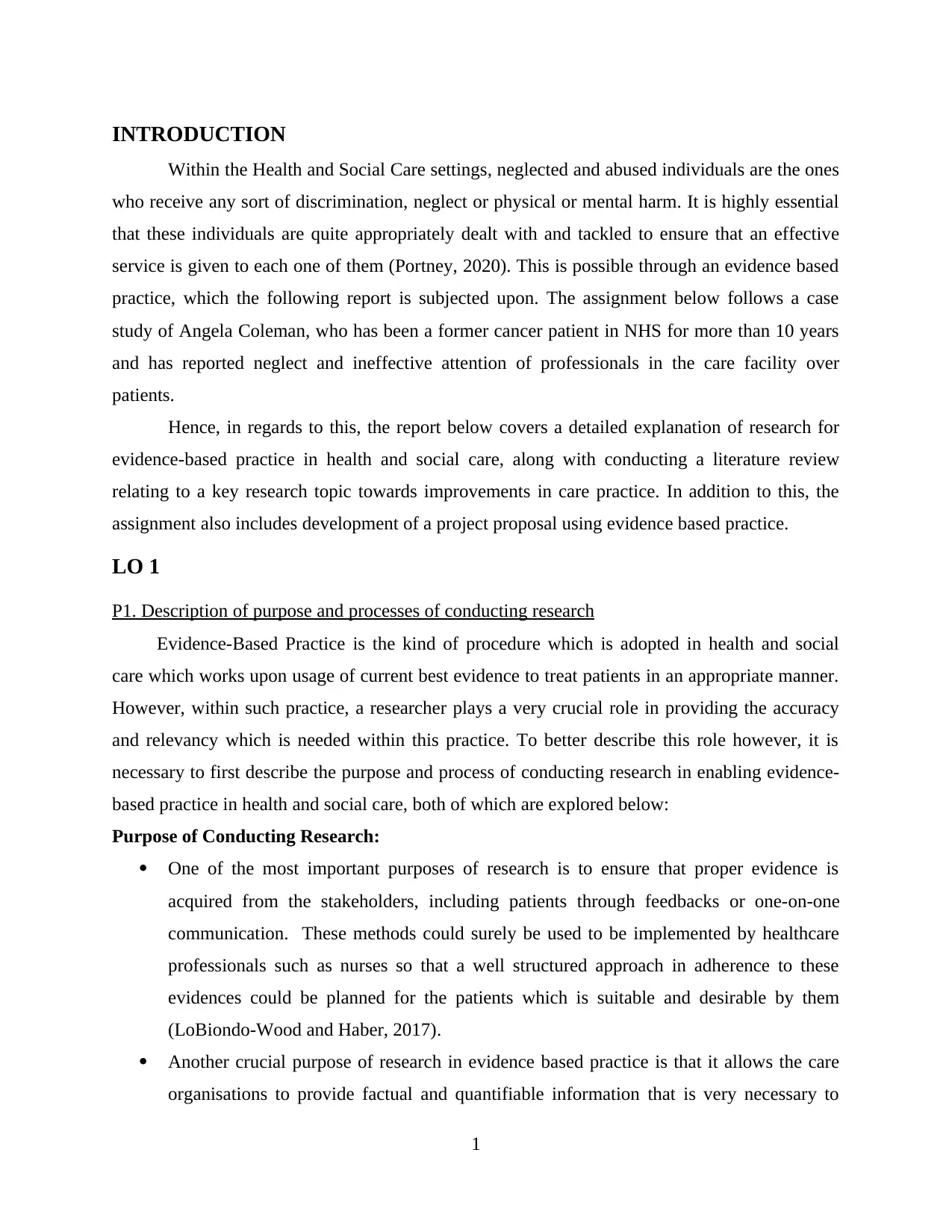
INTRODUCTION
Within the Health and Social Care settings, neglected and abused individuals are the ones
who receive any sort of discrimination, neglect or physical or mental harm. It is highly essential
that these individuals are quite appropriately dealt with and tackled to ensure that an effective
service is given to each one of them (Portney, 2020). This is possible through an evidence based
practice, which the following report is subjected upon. The assignment below follows a case
study of Angela Coleman, who has been a former cancer patient in NHS for more than 10 years
and has reported neglect and ineffective attention of professionals in the care facility over
patients.
Hence, in regards to this, the report below covers a detailed explanation of research for
evidence-based practice in health and social care, along with conducting a literature review
relating to a key research topic towards improvements in care practice. In addition to this, the
assignment also includes development of a project proposal using evidence based practice.
LO 1
P1. Description of purpose and processes of conducting research
Evidence-Based Practice is the kind of procedure which is adopted in health and social
care which works upon usage of current best evidence to treat patients in an appropriate manner.
However, within such practice, a researcher plays a very crucial role in providing the accuracy
and relevancy which is needed within this practice. To better describe this role however, it is
necessary to first describe the purpose and process of conducting research in enabling evidence-
based practice in health and social care, both of which are explored below:
Purpose of Conducting Research:
One of the most important purposes of research is to ensure that proper evidence is
acquired from the stakeholders, including patients through feedbacks or one-on-one
communication. These methods could surely be used to be implemented by healthcare
professionals such as nurses so that a well structured approach in adherence to these
evidences could be planned for the patients which is suitable and desirable by them
(LoBiondo-Wood and Haber, 2017).
Another crucial purpose of research in evidence based practice is that it allows the care
organisations to provide factual and quantifiable information that is very necessary to
1
Within the Health and Social Care settings, neglected and abused individuals are the ones
who receive any sort of discrimination, neglect or physical or mental harm. It is highly essential
that these individuals are quite appropriately dealt with and tackled to ensure that an effective
service is given to each one of them (Portney, 2020). This is possible through an evidence based
practice, which the following report is subjected upon. The assignment below follows a case
study of Angela Coleman, who has been a former cancer patient in NHS for more than 10 years
and has reported neglect and ineffective attention of professionals in the care facility over
patients.
Hence, in regards to this, the report below covers a detailed explanation of research for
evidence-based practice in health and social care, along with conducting a literature review
relating to a key research topic towards improvements in care practice. In addition to this, the
assignment also includes development of a project proposal using evidence based practice.
LO 1
P1. Description of purpose and processes of conducting research
Evidence-Based Practice is the kind of procedure which is adopted in health and social
care which works upon usage of current best evidence to treat patients in an appropriate manner.
However, within such practice, a researcher plays a very crucial role in providing the accuracy
and relevancy which is needed within this practice. To better describe this role however, it is
necessary to first describe the purpose and process of conducting research in enabling evidence-
based practice in health and social care, both of which are explored below:
Purpose of Conducting Research:
One of the most important purposes of research is to ensure that proper evidence is
acquired from the stakeholders, including patients through feedbacks or one-on-one
communication. These methods could surely be used to be implemented by healthcare
professionals such as nurses so that a well structured approach in adherence to these
evidences could be planned for the patients which is suitable and desirable by them
(LoBiondo-Wood and Haber, 2017).
Another crucial purpose of research in evidence based practice is that it allows the care
organisations to provide factual and quantifiable information that is very necessary to
1
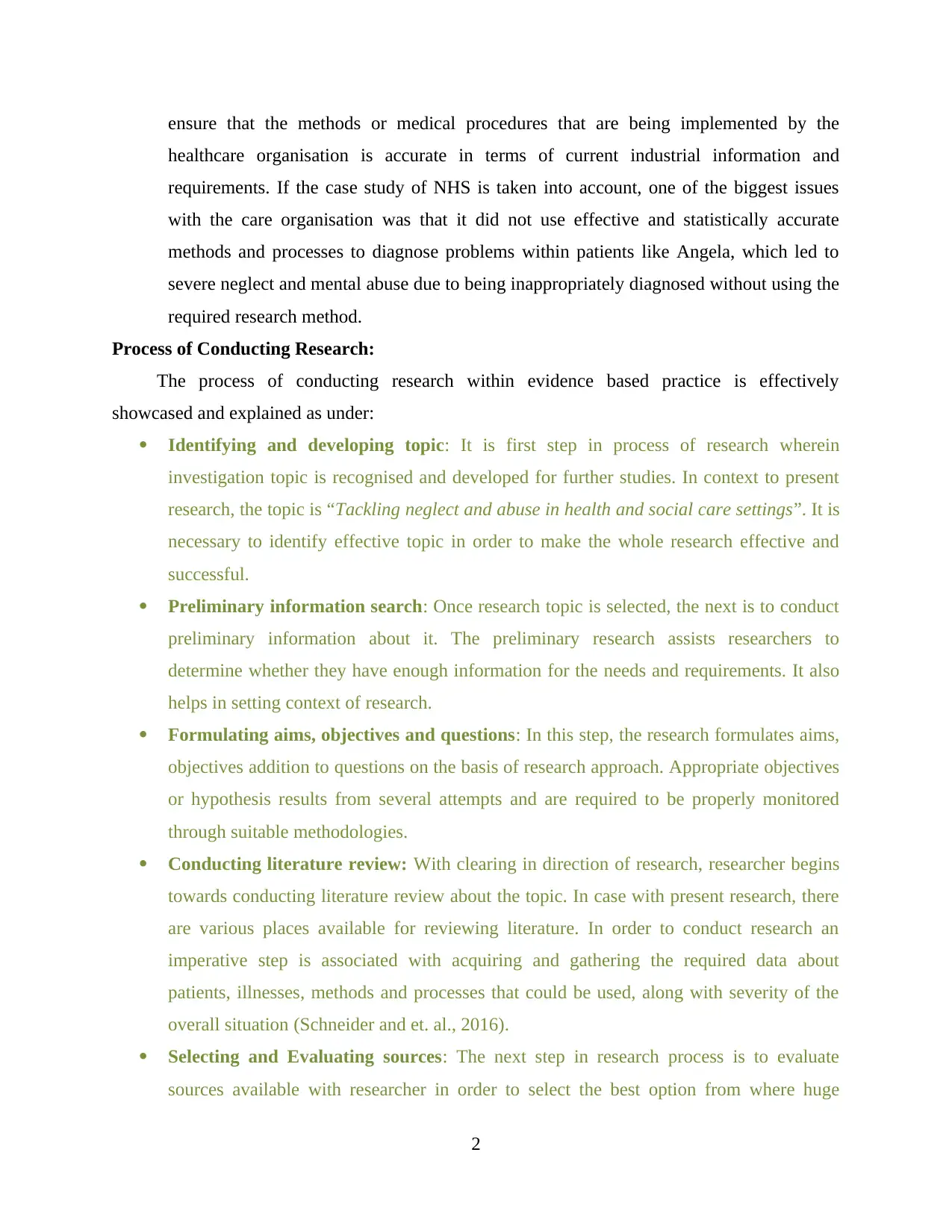
ensure that the methods or medical procedures that are being implemented by the
healthcare organisation is accurate in terms of current industrial information and
requirements. If the case study of NHS is taken into account, one of the biggest issues
with the care organisation was that it did not use effective and statistically accurate
methods and processes to diagnose problems within patients like Angela, which led to
severe neglect and mental abuse due to being inappropriately diagnosed without using the
required research method.
Process of Conducting Research:
The process of conducting research within evidence based practice is effectively
showcased and explained as under:
Identifying and developing topic: It is first step in process of research wherein
investigation topic is recognised and developed for further studies. In context to present
research, the topic is “Tackling neglect and abuse in health and social care settings”. It is
necessary to identify effective topic in order to make the whole research effective and
successful.
Preliminary information search: Once research topic is selected, the next is to conduct
preliminary information about it. The preliminary research assists researchers to
determine whether they have enough information for the needs and requirements. It also
helps in setting context of research.
Formulating aims, objectives and questions: In this step, the research formulates aims,
objectives addition to questions on the basis of research approach. Appropriate objectives
or hypothesis results from several attempts and are required to be properly monitored
through suitable methodologies.
Conducting literature review: With clearing in direction of research, researcher begins
towards conducting literature review about the topic. In case with present research, there
are various places available for reviewing literature. In order to conduct research an
imperative step is associated with acquiring and gathering the required data about
patients, illnesses, methods and processes that could be used, along with severity of the
overall situation (Schneider and et. al., 2016).
Selecting and Evaluating sources: The next step in research process is to evaluate
sources available with researcher in order to select the best option from where huge
2
healthcare organisation is accurate in terms of current industrial information and
requirements. If the case study of NHS is taken into account, one of the biggest issues
with the care organisation was that it did not use effective and statistically accurate
methods and processes to diagnose problems within patients like Angela, which led to
severe neglect and mental abuse due to being inappropriately diagnosed without using the
required research method.
Process of Conducting Research:
The process of conducting research within evidence based practice is effectively
showcased and explained as under:
Identifying and developing topic: It is first step in process of research wherein
investigation topic is recognised and developed for further studies. In context to present
research, the topic is “Tackling neglect and abuse in health and social care settings”. It is
necessary to identify effective topic in order to make the whole research effective and
successful.
Preliminary information search: Once research topic is selected, the next is to conduct
preliminary information about it. The preliminary research assists researchers to
determine whether they have enough information for the needs and requirements. It also
helps in setting context of research.
Formulating aims, objectives and questions: In this step, the research formulates aims,
objectives addition to questions on the basis of research approach. Appropriate objectives
or hypothesis results from several attempts and are required to be properly monitored
through suitable methodologies.
Conducting literature review: With clearing in direction of research, researcher begins
towards conducting literature review about the topic. In case with present research, there
are various places available for reviewing literature. In order to conduct research an
imperative step is associated with acquiring and gathering the required data about
patients, illnesses, methods and processes that could be used, along with severity of the
overall situation (Schneider and et. al., 2016).
Selecting and Evaluating sources: The next step in research process is to evaluate
sources available with researcher in order to select the best option from where huge
2
Secure Best Marks with AI Grader
Need help grading? Try our AI Grader for instant feedback on your assignments.
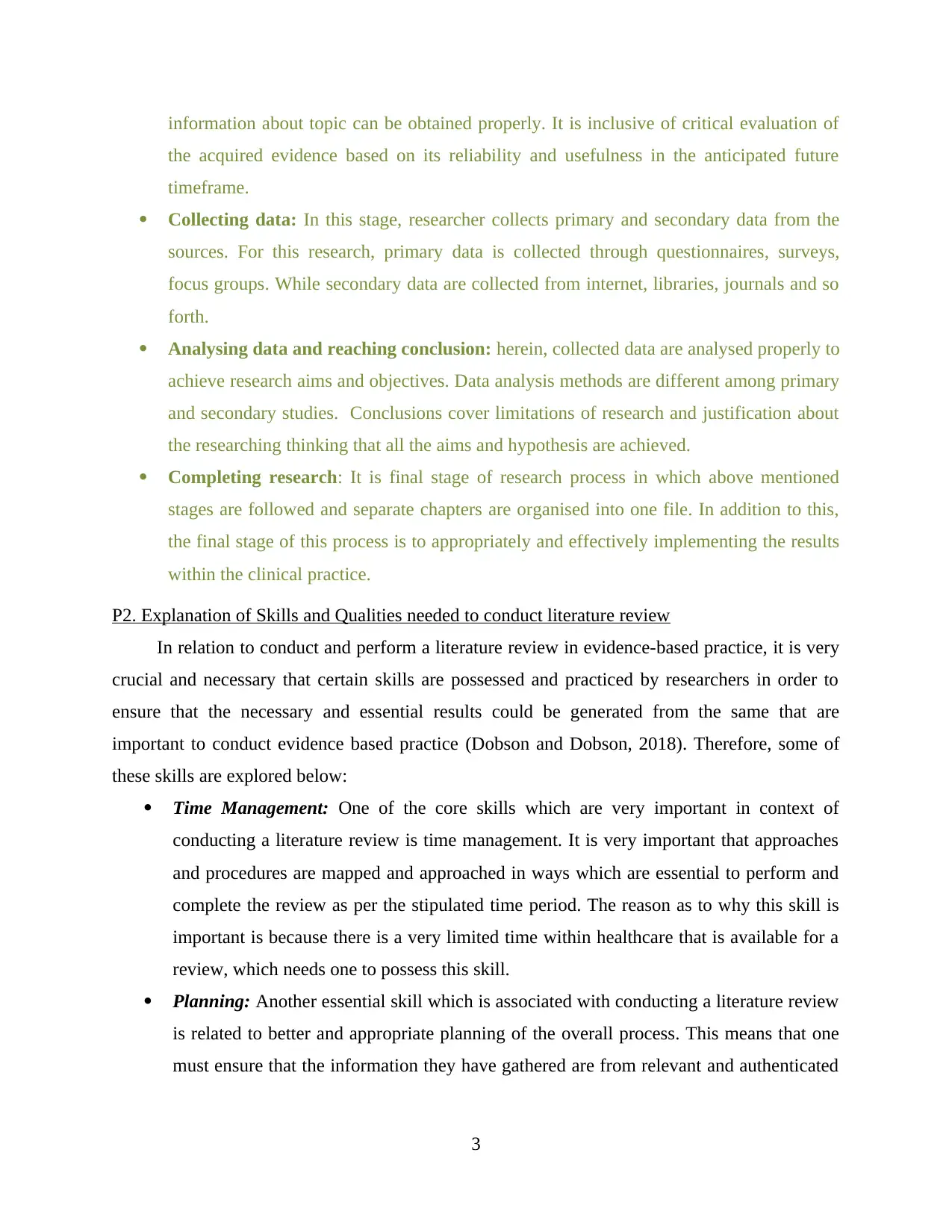
information about topic can be obtained properly. It is inclusive of critical evaluation of
the acquired evidence based on its reliability and usefulness in the anticipated future
timeframe.
Collecting data: In this stage, researcher collects primary and secondary data from the
sources. For this research, primary data is collected through questionnaires, surveys,
focus groups. While secondary data are collected from internet, libraries, journals and so
forth.
Analysing data and reaching conclusion: herein, collected data are analysed properly to
achieve research aims and objectives. Data analysis methods are different among primary
and secondary studies. Conclusions cover limitations of research and justification about
the researching thinking that all the aims and hypothesis are achieved.
Completing research: It is final stage of research process in which above mentioned
stages are followed and separate chapters are organised into one file. In addition to this,
the final stage of this process is to appropriately and effectively implementing the results
within the clinical practice.
P2. Explanation of Skills and Qualities needed to conduct literature review
In relation to conduct and perform a literature review in evidence-based practice, it is very
crucial and necessary that certain skills are possessed and practiced by researchers in order to
ensure that the necessary and essential results could be generated from the same that are
important to conduct evidence based practice (Dobson and Dobson, 2018). Therefore, some of
these skills are explored below:
Time Management: One of the core skills which are very important in context of
conducting a literature review is time management. It is very important that approaches
and procedures are mapped and approached in ways which are essential to perform and
complete the review as per the stipulated time period. The reason as to why this skill is
important is because there is a very limited time within healthcare that is available for a
review, which needs one to possess this skill.
Planning: Another essential skill which is associated with conducting a literature review
is related to better and appropriate planning of the overall process. This means that one
must ensure that the information they have gathered are from relevant and authenticated
3
the acquired evidence based on its reliability and usefulness in the anticipated future
timeframe.
Collecting data: In this stage, researcher collects primary and secondary data from the
sources. For this research, primary data is collected through questionnaires, surveys,
focus groups. While secondary data are collected from internet, libraries, journals and so
forth.
Analysing data and reaching conclusion: herein, collected data are analysed properly to
achieve research aims and objectives. Data analysis methods are different among primary
and secondary studies. Conclusions cover limitations of research and justification about
the researching thinking that all the aims and hypothesis are achieved.
Completing research: It is final stage of research process in which above mentioned
stages are followed and separate chapters are organised into one file. In addition to this,
the final stage of this process is to appropriately and effectively implementing the results
within the clinical practice.
P2. Explanation of Skills and Qualities needed to conduct literature review
In relation to conduct and perform a literature review in evidence-based practice, it is very
crucial and necessary that certain skills are possessed and practiced by researchers in order to
ensure that the necessary and essential results could be generated from the same that are
important to conduct evidence based practice (Dobson and Dobson, 2018). Therefore, some of
these skills are explored below:
Time Management: One of the core skills which are very important in context of
conducting a literature review is time management. It is very important that approaches
and procedures are mapped and approached in ways which are essential to perform and
complete the review as per the stipulated time period. The reason as to why this skill is
important is because there is a very limited time within healthcare that is available for a
review, which needs one to possess this skill.
Planning: Another essential skill which is associated with conducting a literature review
is related to better and appropriate planning of the overall process. This means that one
must ensure that the information they have gathered are from relevant and authenticated
3
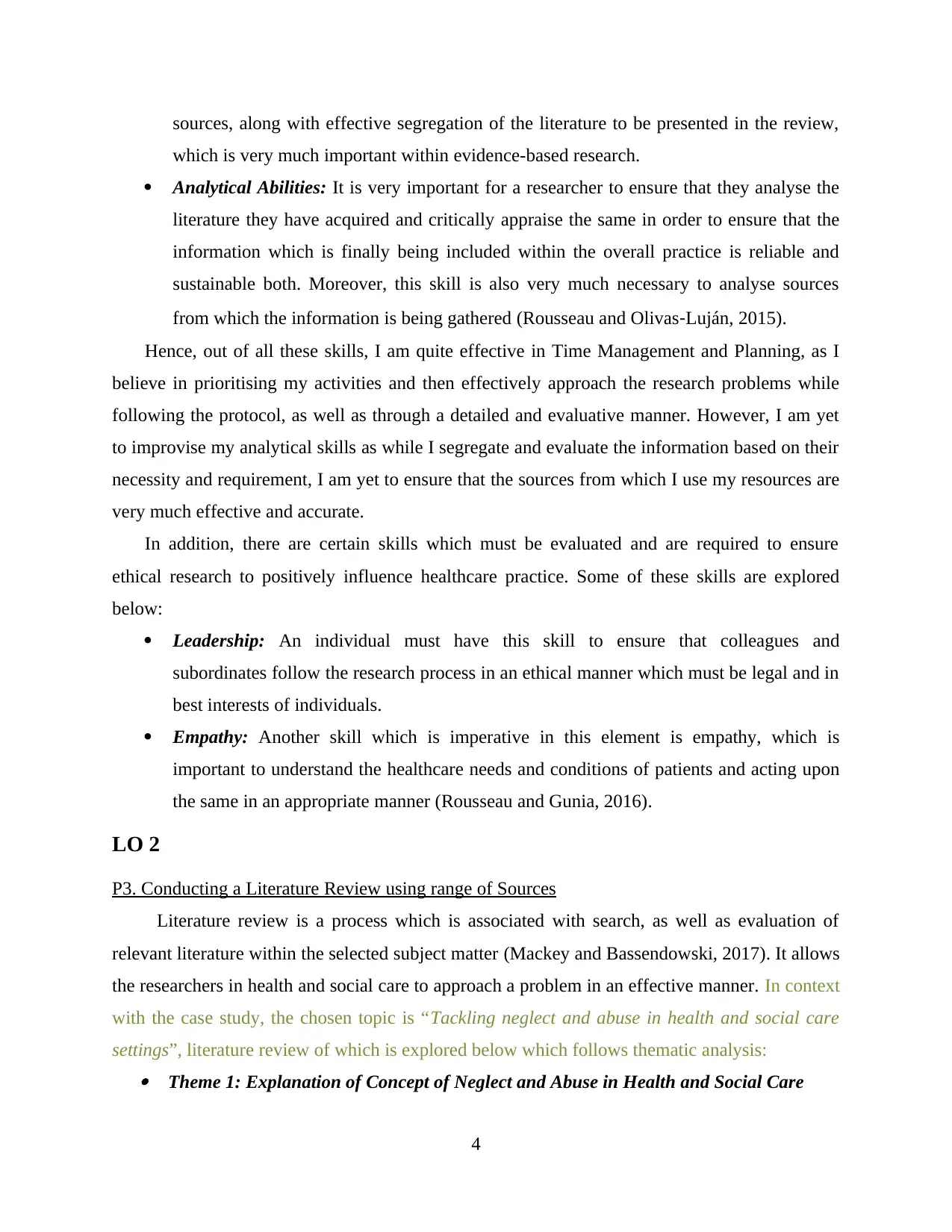
sources, along with effective segregation of the literature to be presented in the review,
which is very much important within evidence-based research.
Analytical Abilities: It is very important for a researcher to ensure that they analyse the
literature they have acquired and critically appraise the same in order to ensure that the
information which is finally being included within the overall practice is reliable and
sustainable both. Moreover, this skill is also very much necessary to analyse sources
from which the information is being gathered (Rousseau and Olivas‐Luján, 2015).
Hence, out of all these skills, I am quite effective in Time Management and Planning, as I
believe in prioritising my activities and then effectively approach the research problems while
following the protocol, as well as through a detailed and evaluative manner. However, I am yet
to improvise my analytical skills as while I segregate and evaluate the information based on their
necessity and requirement, I am yet to ensure that the sources from which I use my resources are
very much effective and accurate.
In addition, there are certain skills which must be evaluated and are required to ensure
ethical research to positively influence healthcare practice. Some of these skills are explored
below:
Leadership: An individual must have this skill to ensure that colleagues and
subordinates follow the research process in an ethical manner which must be legal and in
best interests of individuals.
Empathy: Another skill which is imperative in this element is empathy, which is
important to understand the healthcare needs and conditions of patients and acting upon
the same in an appropriate manner (Rousseau and Gunia, 2016).
LO 2
P3. Conducting a Literature Review using range of Sources
Literature review is a process which is associated with search, as well as evaluation of
relevant literature within the selected subject matter (Mackey and Bassendowski, 2017). It allows
the researchers in health and social care to approach a problem in an effective manner. In context
with the case study, the chosen topic is “Tackling neglect and abuse in health and social care
settings”, literature review of which is explored below which follows thematic analysis: Theme 1: Explanation of Concept of Neglect and Abuse in Health and Social Care
4
which is very much important within evidence-based research.
Analytical Abilities: It is very important for a researcher to ensure that they analyse the
literature they have acquired and critically appraise the same in order to ensure that the
information which is finally being included within the overall practice is reliable and
sustainable both. Moreover, this skill is also very much necessary to analyse sources
from which the information is being gathered (Rousseau and Olivas‐Luján, 2015).
Hence, out of all these skills, I am quite effective in Time Management and Planning, as I
believe in prioritising my activities and then effectively approach the research problems while
following the protocol, as well as through a detailed and evaluative manner. However, I am yet
to improvise my analytical skills as while I segregate and evaluate the information based on their
necessity and requirement, I am yet to ensure that the sources from which I use my resources are
very much effective and accurate.
In addition, there are certain skills which must be evaluated and are required to ensure
ethical research to positively influence healthcare practice. Some of these skills are explored
below:
Leadership: An individual must have this skill to ensure that colleagues and
subordinates follow the research process in an ethical manner which must be legal and in
best interests of individuals.
Empathy: Another skill which is imperative in this element is empathy, which is
important to understand the healthcare needs and conditions of patients and acting upon
the same in an appropriate manner (Rousseau and Gunia, 2016).
LO 2
P3. Conducting a Literature Review using range of Sources
Literature review is a process which is associated with search, as well as evaluation of
relevant literature within the selected subject matter (Mackey and Bassendowski, 2017). It allows
the researchers in health and social care to approach a problem in an effective manner. In context
with the case study, the chosen topic is “Tackling neglect and abuse in health and social care
settings”, literature review of which is explored below which follows thematic analysis: Theme 1: Explanation of Concept of Neglect and Abuse in Health and Social Care
4
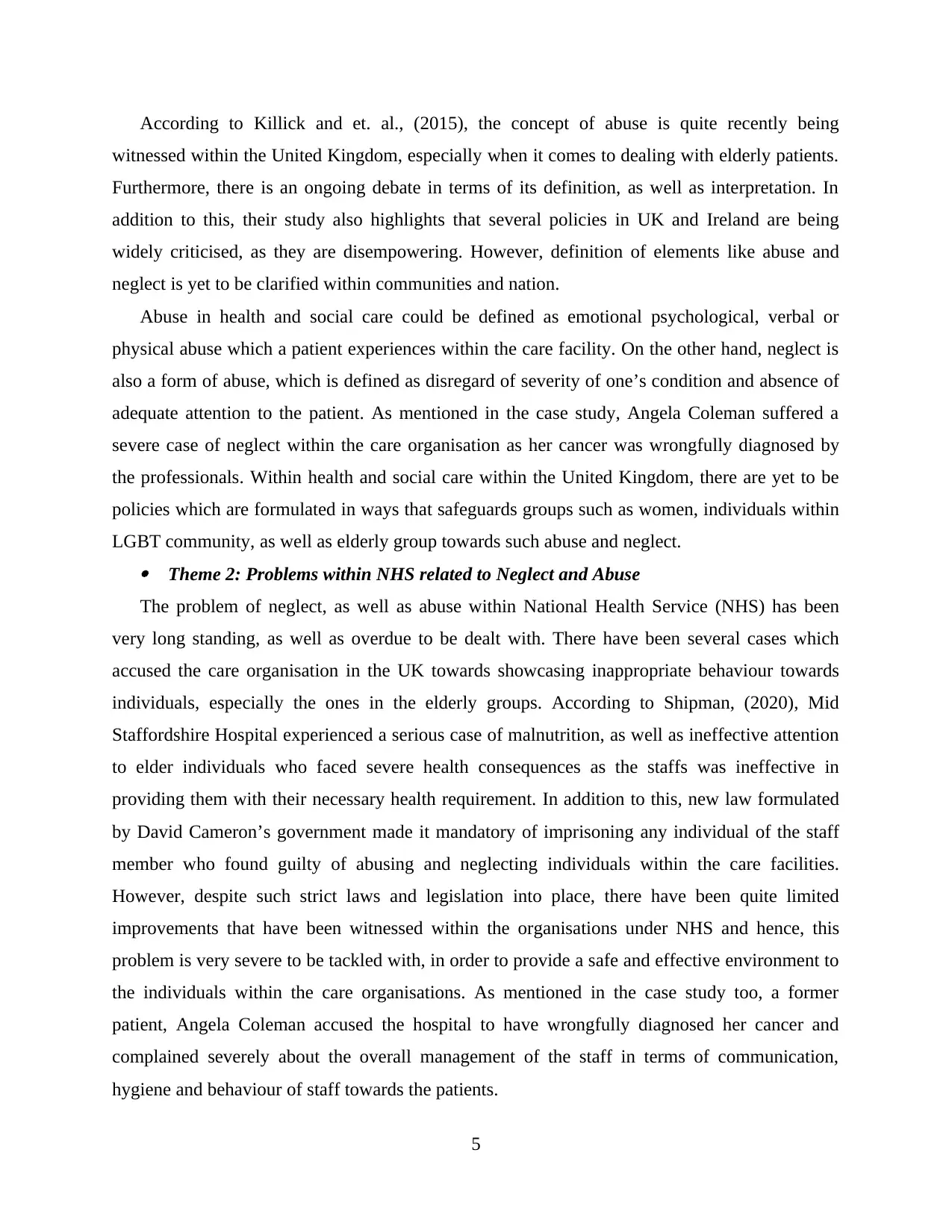
According to Killick and et. al., (2015), the concept of abuse is quite recently being
witnessed within the United Kingdom, especially when it comes to dealing with elderly patients.
Furthermore, there is an ongoing debate in terms of its definition, as well as interpretation. In
addition to this, their study also highlights that several policies in UK and Ireland are being
widely criticised, as they are disempowering. However, definition of elements like abuse and
neglect is yet to be clarified within communities and nation.
Abuse in health and social care could be defined as emotional psychological, verbal or
physical abuse which a patient experiences within the care facility. On the other hand, neglect is
also a form of abuse, which is defined as disregard of severity of one’s condition and absence of
adequate attention to the patient. As mentioned in the case study, Angela Coleman suffered a
severe case of neglect within the care organisation as her cancer was wrongfully diagnosed by
the professionals. Within health and social care within the United Kingdom, there are yet to be
policies which are formulated in ways that safeguards groups such as women, individuals within
LGBT community, as well as elderly group towards such abuse and neglect. Theme 2: Problems within NHS related to Neglect and Abuse
The problem of neglect, as well as abuse within National Health Service (NHS) has been
very long standing, as well as overdue to be dealt with. There have been several cases which
accused the care organisation in the UK towards showcasing inappropriate behaviour towards
individuals, especially the ones in the elderly groups. According to Shipman, (2020), Mid
Staffordshire Hospital experienced a serious case of malnutrition, as well as ineffective attention
to elder individuals who faced severe health consequences as the staffs was ineffective in
providing them with their necessary health requirement. In addition to this, new law formulated
by David Cameron’s government made it mandatory of imprisoning any individual of the staff
member who found guilty of abusing and neglecting individuals within the care facilities.
However, despite such strict laws and legislation into place, there have been quite limited
improvements that have been witnessed within the organisations under NHS and hence, this
problem is very severe to be tackled with, in order to provide a safe and effective environment to
the individuals within the care organisations. As mentioned in the case study too, a former
patient, Angela Coleman accused the hospital to have wrongfully diagnosed her cancer and
complained severely about the overall management of the staff in terms of communication,
hygiene and behaviour of staff towards the patients.
5
witnessed within the United Kingdom, especially when it comes to dealing with elderly patients.
Furthermore, there is an ongoing debate in terms of its definition, as well as interpretation. In
addition to this, their study also highlights that several policies in UK and Ireland are being
widely criticised, as they are disempowering. However, definition of elements like abuse and
neglect is yet to be clarified within communities and nation.
Abuse in health and social care could be defined as emotional psychological, verbal or
physical abuse which a patient experiences within the care facility. On the other hand, neglect is
also a form of abuse, which is defined as disregard of severity of one’s condition and absence of
adequate attention to the patient. As mentioned in the case study, Angela Coleman suffered a
severe case of neglect within the care organisation as her cancer was wrongfully diagnosed by
the professionals. Within health and social care within the United Kingdom, there are yet to be
policies which are formulated in ways that safeguards groups such as women, individuals within
LGBT community, as well as elderly group towards such abuse and neglect. Theme 2: Problems within NHS related to Neglect and Abuse
The problem of neglect, as well as abuse within National Health Service (NHS) has been
very long standing, as well as overdue to be dealt with. There have been several cases which
accused the care organisation in the UK towards showcasing inappropriate behaviour towards
individuals, especially the ones in the elderly groups. According to Shipman, (2020), Mid
Staffordshire Hospital experienced a serious case of malnutrition, as well as ineffective attention
to elder individuals who faced severe health consequences as the staffs was ineffective in
providing them with their necessary health requirement. In addition to this, new law formulated
by David Cameron’s government made it mandatory of imprisoning any individual of the staff
member who found guilty of abusing and neglecting individuals within the care facilities.
However, despite such strict laws and legislation into place, there have been quite limited
improvements that have been witnessed within the organisations under NHS and hence, this
problem is very severe to be tackled with, in order to provide a safe and effective environment to
the individuals within the care organisations. As mentioned in the case study too, a former
patient, Angela Coleman accused the hospital to have wrongfully diagnosed her cancer and
complained severely about the overall management of the staff in terms of communication,
hygiene and behaviour of staff towards the patients.
5
Paraphrase This Document
Need a fresh take? Get an instant paraphrase of this document with our AI Paraphraser
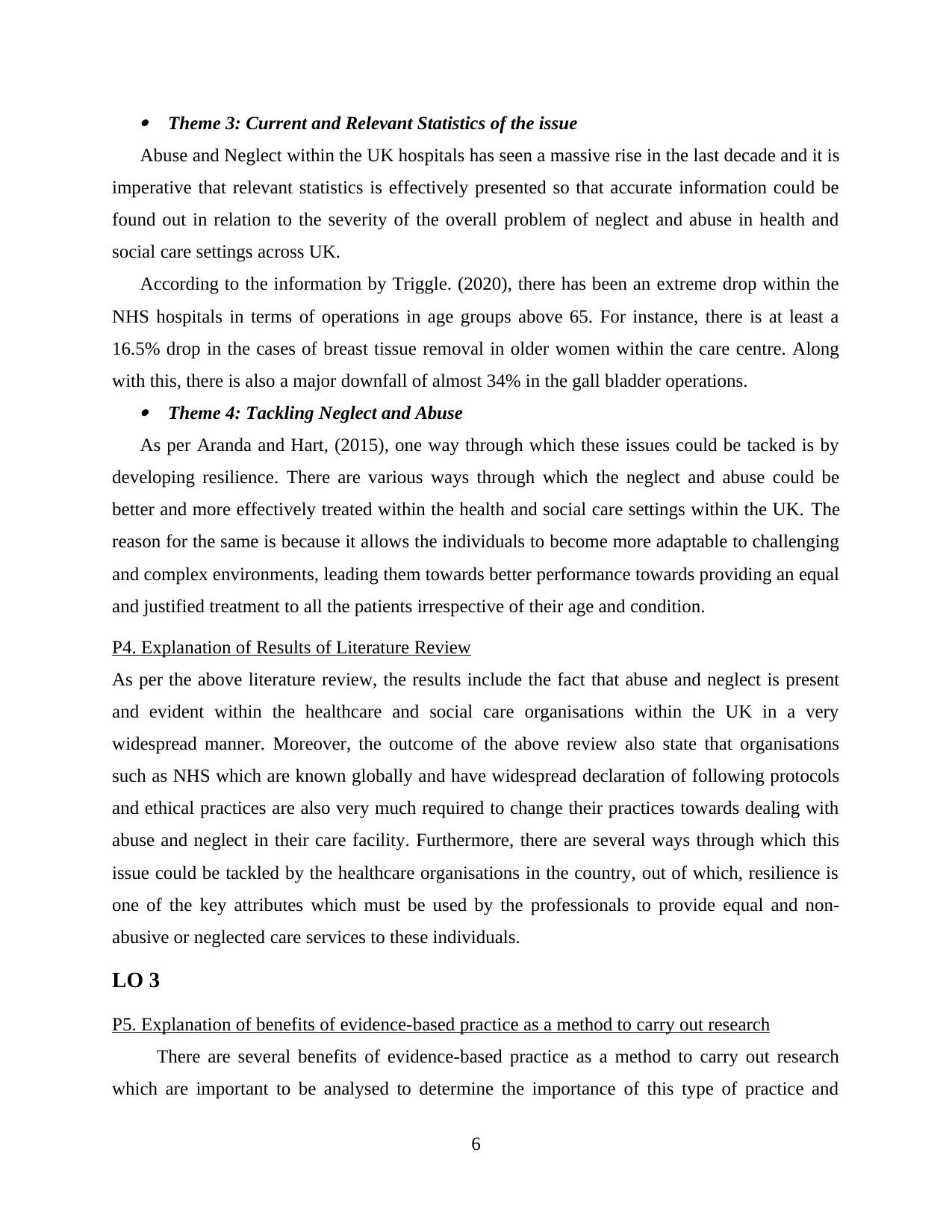
Theme 3: Current and Relevant Statistics of the issue
Abuse and Neglect within the UK hospitals has seen a massive rise in the last decade and it is
imperative that relevant statistics is effectively presented so that accurate information could be
found out in relation to the severity of the overall problem of neglect and abuse in health and
social care settings across UK.
According to the information by Triggle. (2020), there has been an extreme drop within the
NHS hospitals in terms of operations in age groups above 65. For instance, there is at least a
16.5% drop in the cases of breast tissue removal in older women within the care centre. Along
with this, there is also a major downfall of almost 34% in the gall bladder operations. Theme 4: Tackling Neglect and Abuse
As per Aranda and Hart, (2015), one way through which these issues could be tacked is by
developing resilience. There are various ways through which the neglect and abuse could be
better and more effectively treated within the health and social care settings within the UK. The
reason for the same is because it allows the individuals to become more adaptable to challenging
and complex environments, leading them towards better performance towards providing an equal
and justified treatment to all the patients irrespective of their age and condition.
P4. Explanation of Results of Literature Review
As per the above literature review, the results include the fact that abuse and neglect is present
and evident within the healthcare and social care organisations within the UK in a very
widespread manner. Moreover, the outcome of the above review also state that organisations
such as NHS which are known globally and have widespread declaration of following protocols
and ethical practices are also very much required to change their practices towards dealing with
abuse and neglect in their care facility. Furthermore, there are several ways through which this
issue could be tackled by the healthcare organisations in the country, out of which, resilience is
one of the key attributes which must be used by the professionals to provide equal and non-
abusive or neglected care services to these individuals.
LO 3
P5. Explanation of benefits of evidence-based practice as a method to carry out research
There are several benefits of evidence-based practice as a method to carry out research
which are important to be analysed to determine the importance of this type of practice and
6
Abuse and Neglect within the UK hospitals has seen a massive rise in the last decade and it is
imperative that relevant statistics is effectively presented so that accurate information could be
found out in relation to the severity of the overall problem of neglect and abuse in health and
social care settings across UK.
According to the information by Triggle. (2020), there has been an extreme drop within the
NHS hospitals in terms of operations in age groups above 65. For instance, there is at least a
16.5% drop in the cases of breast tissue removal in older women within the care centre. Along
with this, there is also a major downfall of almost 34% in the gall bladder operations. Theme 4: Tackling Neglect and Abuse
As per Aranda and Hart, (2015), one way through which these issues could be tacked is by
developing resilience. There are various ways through which the neglect and abuse could be
better and more effectively treated within the health and social care settings within the UK. The
reason for the same is because it allows the individuals to become more adaptable to challenging
and complex environments, leading them towards better performance towards providing an equal
and justified treatment to all the patients irrespective of their age and condition.
P4. Explanation of Results of Literature Review
As per the above literature review, the results include the fact that abuse and neglect is present
and evident within the healthcare and social care organisations within the UK in a very
widespread manner. Moreover, the outcome of the above review also state that organisations
such as NHS which are known globally and have widespread declaration of following protocols
and ethical practices are also very much required to change their practices towards dealing with
abuse and neglect in their care facility. Furthermore, there are several ways through which this
issue could be tackled by the healthcare organisations in the country, out of which, resilience is
one of the key attributes which must be used by the professionals to provide equal and non-
abusive or neglected care services to these individuals.
LO 3
P5. Explanation of benefits of evidence-based practice as a method to carry out research
There are several benefits of evidence-based practice as a method to carry out research
which are important to be analysed to determine the importance of this type of practice and
6
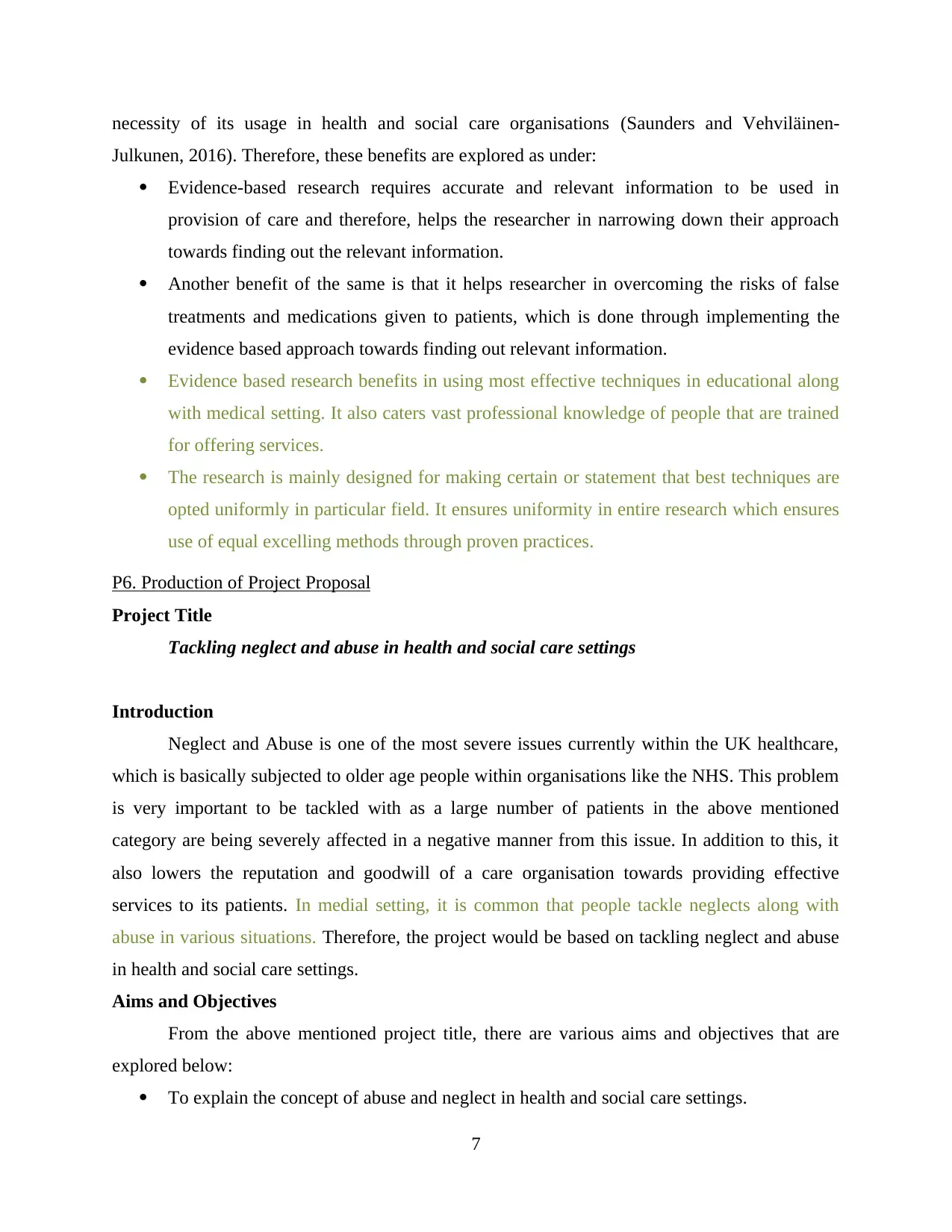
necessity of its usage in health and social care organisations (Saunders and Vehviläinen-
Julkunen, 2016). Therefore, these benefits are explored as under:
Evidence-based research requires accurate and relevant information to be used in
provision of care and therefore, helps the researcher in narrowing down their approach
towards finding out the relevant information.
Another benefit of the same is that it helps researcher in overcoming the risks of false
treatments and medications given to patients, which is done through implementing the
evidence based approach towards finding out relevant information.
Evidence based research benefits in using most effective techniques in educational along
with medical setting. It also caters vast professional knowledge of people that are trained
for offering services.
The research is mainly designed for making certain or statement that best techniques are
opted uniformly in particular field. It ensures uniformity in entire research which ensures
use of equal excelling methods through proven practices.
P6. Production of Project Proposal
Project Title
Tackling neglect and abuse in health and social care settings
Introduction
Neglect and Abuse is one of the most severe issues currently within the UK healthcare,
which is basically subjected to older age people within organisations like the NHS. This problem
is very important to be tackled with as a large number of patients in the above mentioned
category are being severely affected in a negative manner from this issue. In addition to this, it
also lowers the reputation and goodwill of a care organisation towards providing effective
services to its patients. In medial setting, it is common that people tackle neglects along with
abuse in various situations. Therefore, the project would be based on tackling neglect and abuse
in health and social care settings.
Aims and Objectives
From the above mentioned project title, there are various aims and objectives that are
explored below:
To explain the concept of abuse and neglect in health and social care settings.
7
Julkunen, 2016). Therefore, these benefits are explored as under:
Evidence-based research requires accurate and relevant information to be used in
provision of care and therefore, helps the researcher in narrowing down their approach
towards finding out the relevant information.
Another benefit of the same is that it helps researcher in overcoming the risks of false
treatments and medications given to patients, which is done through implementing the
evidence based approach towards finding out relevant information.
Evidence based research benefits in using most effective techniques in educational along
with medical setting. It also caters vast professional knowledge of people that are trained
for offering services.
The research is mainly designed for making certain or statement that best techniques are
opted uniformly in particular field. It ensures uniformity in entire research which ensures
use of equal excelling methods through proven practices.
P6. Production of Project Proposal
Project Title
Tackling neglect and abuse in health and social care settings
Introduction
Neglect and Abuse is one of the most severe issues currently within the UK healthcare,
which is basically subjected to older age people within organisations like the NHS. This problem
is very important to be tackled with as a large number of patients in the above mentioned
category are being severely affected in a negative manner from this issue. In addition to this, it
also lowers the reputation and goodwill of a care organisation towards providing effective
services to its patients. In medial setting, it is common that people tackle neglects along with
abuse in various situations. Therefore, the project would be based on tackling neglect and abuse
in health and social care settings.
Aims and Objectives
From the above mentioned project title, there are various aims and objectives that are
explored below:
To explain the concept of abuse and neglect in health and social care settings.
7
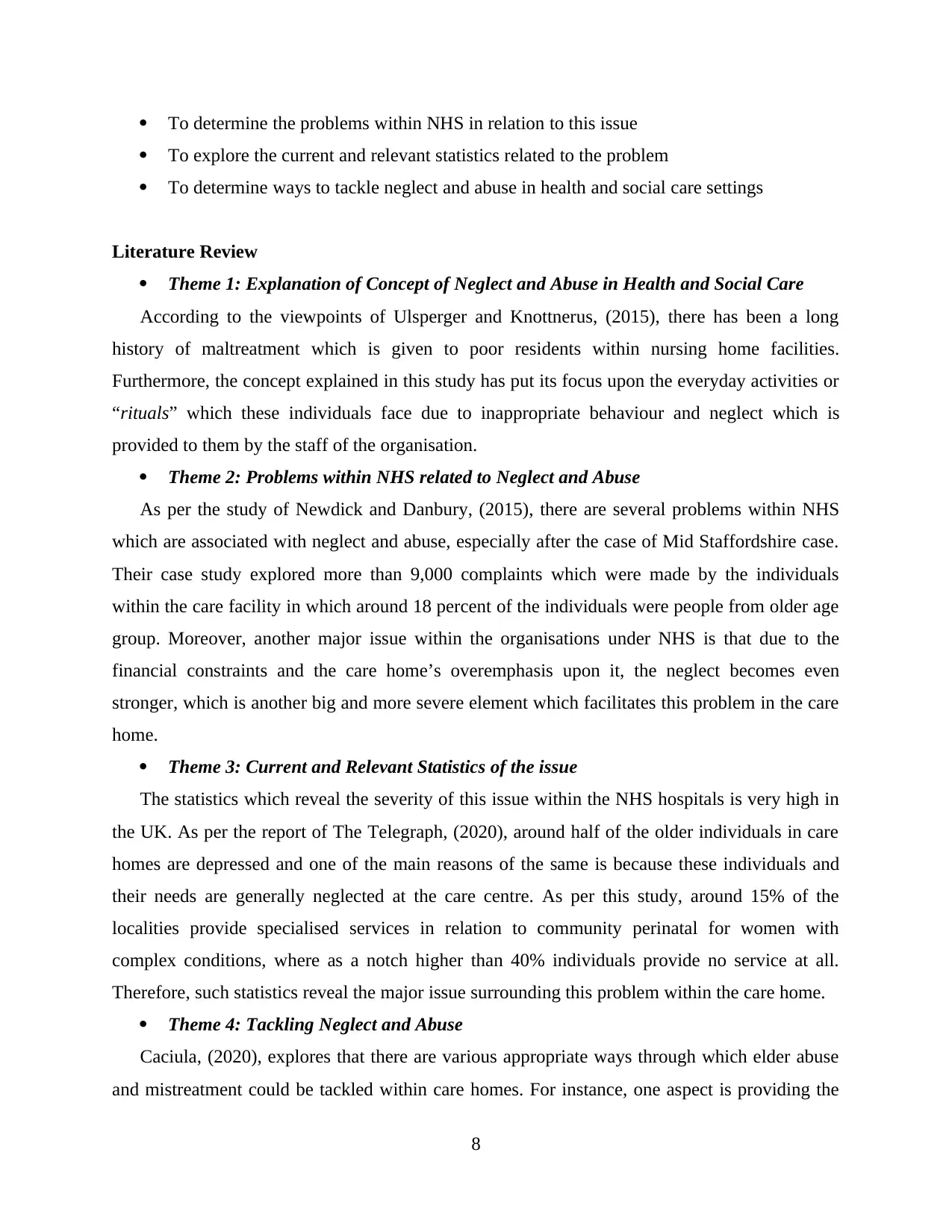
To determine the problems within NHS in relation to this issue
To explore the current and relevant statistics related to the problem
To determine ways to tackle neglect and abuse in health and social care settings
Literature Review
Theme 1: Explanation of Concept of Neglect and Abuse in Health and Social Care
According to the viewpoints of Ulsperger and Knottnerus, (2015), there has been a long
history of maltreatment which is given to poor residents within nursing home facilities.
Furthermore, the concept explained in this study has put its focus upon the everyday activities or
“rituals” which these individuals face due to inappropriate behaviour and neglect which is
provided to them by the staff of the organisation.
Theme 2: Problems within NHS related to Neglect and Abuse
As per the study of Newdick and Danbury, (2015), there are several problems within NHS
which are associated with neglect and abuse, especially after the case of Mid Staffordshire case.
Their case study explored more than 9,000 complaints which were made by the individuals
within the care facility in which around 18 percent of the individuals were people from older age
group. Moreover, another major issue within the organisations under NHS is that due to the
financial constraints and the care home’s overemphasis upon it, the neglect becomes even
stronger, which is another big and more severe element which facilitates this problem in the care
home.
Theme 3: Current and Relevant Statistics of the issue
The statistics which reveal the severity of this issue within the NHS hospitals is very high in
the UK. As per the report of The Telegraph, (2020), around half of the older individuals in care
homes are depressed and one of the main reasons of the same is because these individuals and
their needs are generally neglected at the care centre. As per this study, around 15% of the
localities provide specialised services in relation to community perinatal for women with
complex conditions, where as a notch higher than 40% individuals provide no service at all.
Therefore, such statistics reveal the major issue surrounding this problem within the care home.
Theme 4: Tackling Neglect and Abuse
Caciula, (2020), explores that there are various appropriate ways through which elder abuse
and mistreatment could be tackled within care homes. For instance, one aspect is providing the
8
To explore the current and relevant statistics related to the problem
To determine ways to tackle neglect and abuse in health and social care settings
Literature Review
Theme 1: Explanation of Concept of Neglect and Abuse in Health and Social Care
According to the viewpoints of Ulsperger and Knottnerus, (2015), there has been a long
history of maltreatment which is given to poor residents within nursing home facilities.
Furthermore, the concept explained in this study has put its focus upon the everyday activities or
“rituals” which these individuals face due to inappropriate behaviour and neglect which is
provided to them by the staff of the organisation.
Theme 2: Problems within NHS related to Neglect and Abuse
As per the study of Newdick and Danbury, (2015), there are several problems within NHS
which are associated with neglect and abuse, especially after the case of Mid Staffordshire case.
Their case study explored more than 9,000 complaints which were made by the individuals
within the care facility in which around 18 percent of the individuals were people from older age
group. Moreover, another major issue within the organisations under NHS is that due to the
financial constraints and the care home’s overemphasis upon it, the neglect becomes even
stronger, which is another big and more severe element which facilitates this problem in the care
home.
Theme 3: Current and Relevant Statistics of the issue
The statistics which reveal the severity of this issue within the NHS hospitals is very high in
the UK. As per the report of The Telegraph, (2020), around half of the older individuals in care
homes are depressed and one of the main reasons of the same is because these individuals and
their needs are generally neglected at the care centre. As per this study, around 15% of the
localities provide specialised services in relation to community perinatal for women with
complex conditions, where as a notch higher than 40% individuals provide no service at all.
Therefore, such statistics reveal the major issue surrounding this problem within the care home.
Theme 4: Tackling Neglect and Abuse
Caciula, (2020), explores that there are various appropriate ways through which elder abuse
and mistreatment could be tackled within care homes. For instance, one aspect is providing the
8
Secure Best Marks with AI Grader
Need help grading? Try our AI Grader for instant feedback on your assignments.
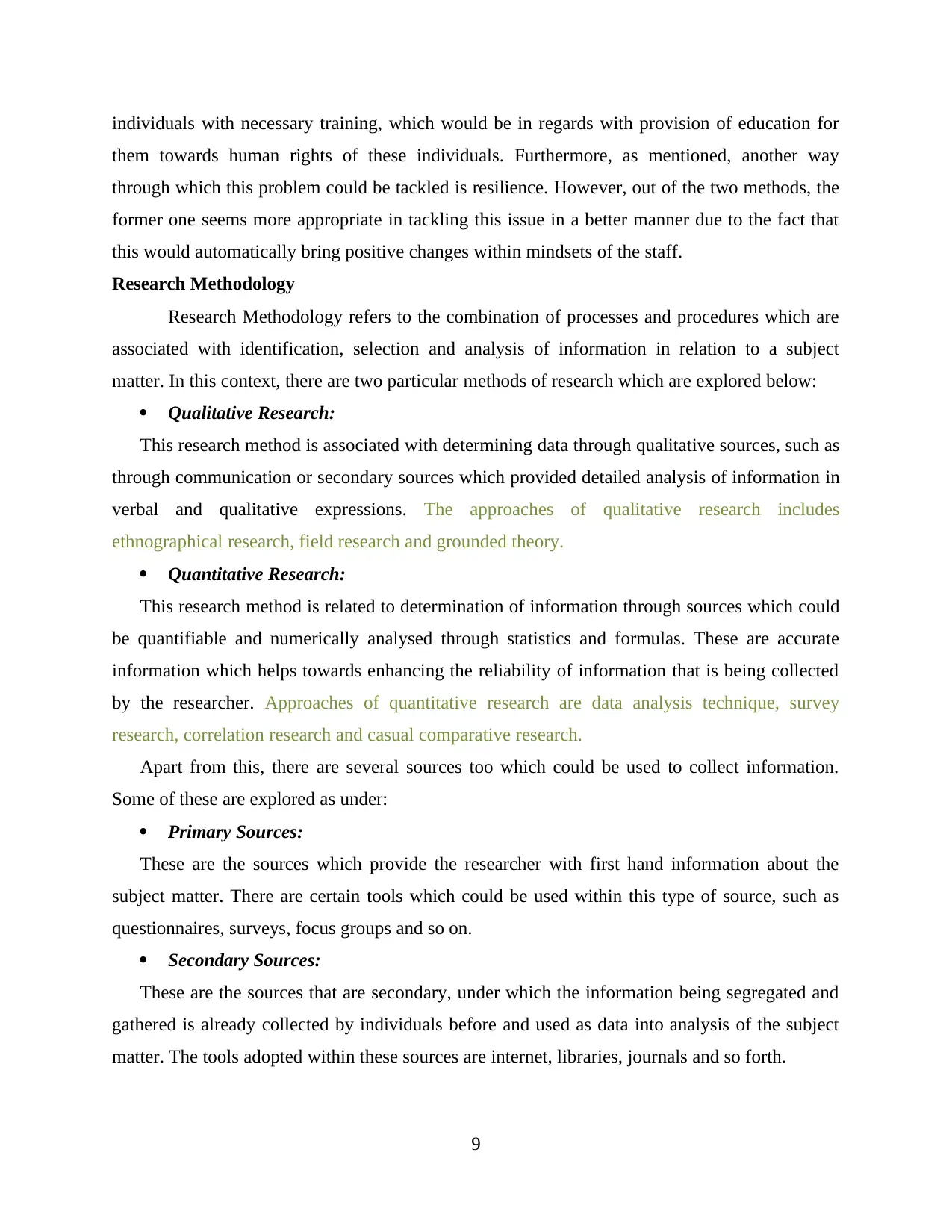
individuals with necessary training, which would be in regards with provision of education for
them towards human rights of these individuals. Furthermore, as mentioned, another way
through which this problem could be tackled is resilience. However, out of the two methods, the
former one seems more appropriate in tackling this issue in a better manner due to the fact that
this would automatically bring positive changes within mindsets of the staff.
Research Methodology
Research Methodology refers to the combination of processes and procedures which are
associated with identification, selection and analysis of information in relation to a subject
matter. In this context, there are two particular methods of research which are explored below:
Qualitative Research:
This research method is associated with determining data through qualitative sources, such as
through communication or secondary sources which provided detailed analysis of information in
verbal and qualitative expressions. The approaches of qualitative research includes
ethnographical research, field research and grounded theory.
Quantitative Research:
This research method is related to determination of information through sources which could
be quantifiable and numerically analysed through statistics and formulas. These are accurate
information which helps towards enhancing the reliability of information that is being collected
by the researcher. Approaches of quantitative research are data analysis technique, survey
research, correlation research and casual comparative research.
Apart from this, there are several sources too which could be used to collect information.
Some of these are explored as under:
Primary Sources:
These are the sources which provide the researcher with first hand information about the
subject matter. There are certain tools which could be used within this type of source, such as
questionnaires, surveys, focus groups and so on.
Secondary Sources:
These are the sources that are secondary, under which the information being segregated and
gathered is already collected by individuals before and used as data into analysis of the subject
matter. The tools adopted within these sources are internet, libraries, journals and so forth.
9
them towards human rights of these individuals. Furthermore, as mentioned, another way
through which this problem could be tackled is resilience. However, out of the two methods, the
former one seems more appropriate in tackling this issue in a better manner due to the fact that
this would automatically bring positive changes within mindsets of the staff.
Research Methodology
Research Methodology refers to the combination of processes and procedures which are
associated with identification, selection and analysis of information in relation to a subject
matter. In this context, there are two particular methods of research which are explored below:
Qualitative Research:
This research method is associated with determining data through qualitative sources, such as
through communication or secondary sources which provided detailed analysis of information in
verbal and qualitative expressions. The approaches of qualitative research includes
ethnographical research, field research and grounded theory.
Quantitative Research:
This research method is related to determination of information through sources which could
be quantifiable and numerically analysed through statistics and formulas. These are accurate
information which helps towards enhancing the reliability of information that is being collected
by the researcher. Approaches of quantitative research are data analysis technique, survey
research, correlation research and casual comparative research.
Apart from this, there are several sources too which could be used to collect information.
Some of these are explored as under:
Primary Sources:
These are the sources which provide the researcher with first hand information about the
subject matter. There are certain tools which could be used within this type of source, such as
questionnaires, surveys, focus groups and so on.
Secondary Sources:
These are the sources that are secondary, under which the information being segregated and
gathered is already collected by individuals before and used as data into analysis of the subject
matter. The tools adopted within these sources are internet, libraries, journals and so forth.
9
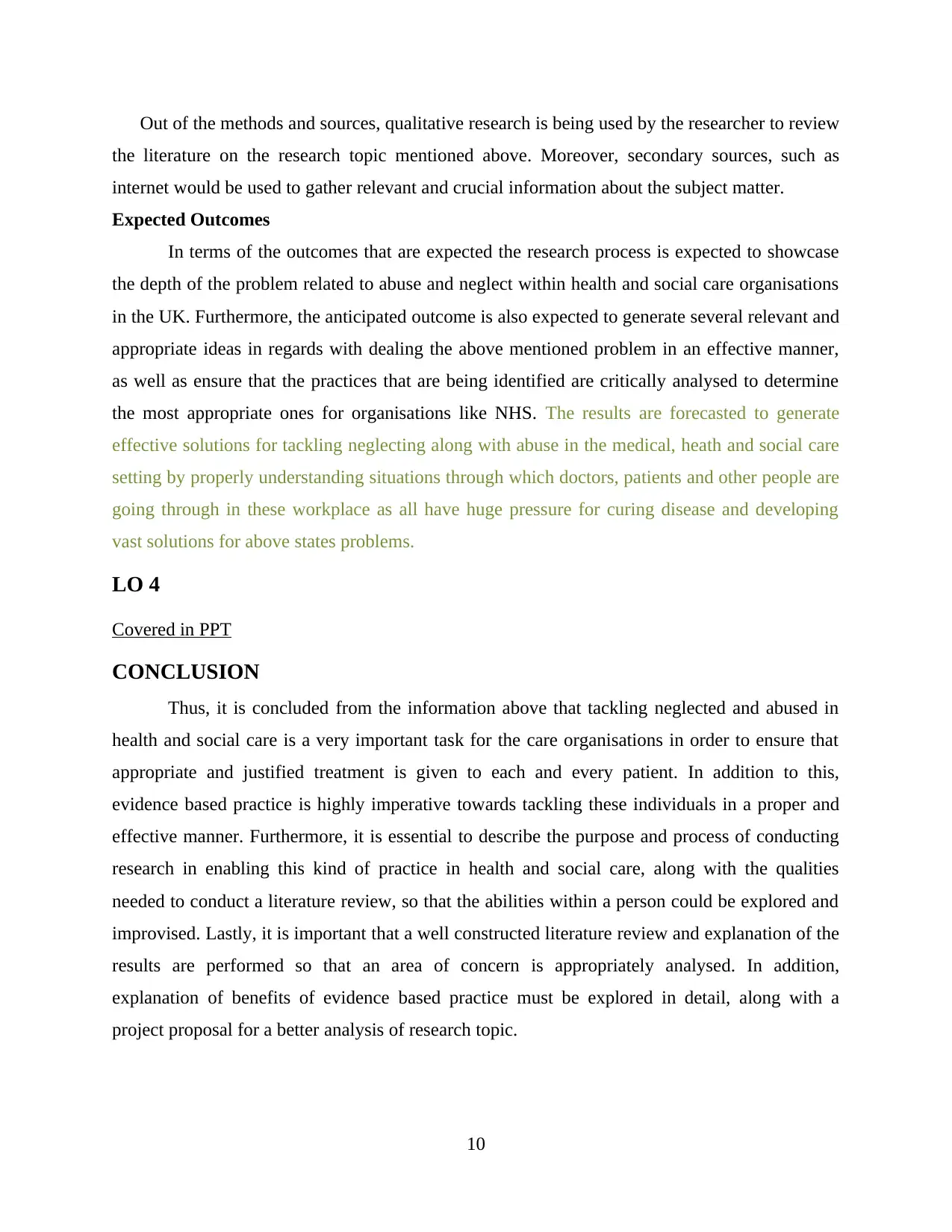
Out of the methods and sources, qualitative research is being used by the researcher to review
the literature on the research topic mentioned above. Moreover, secondary sources, such as
internet would be used to gather relevant and crucial information about the subject matter.
Expected Outcomes
In terms of the outcomes that are expected the research process is expected to showcase
the depth of the problem related to abuse and neglect within health and social care organisations
in the UK. Furthermore, the anticipated outcome is also expected to generate several relevant and
appropriate ideas in regards with dealing the above mentioned problem in an effective manner,
as well as ensure that the practices that are being identified are critically analysed to determine
the most appropriate ones for organisations like NHS. The results are forecasted to generate
effective solutions for tackling neglecting along with abuse in the medical, heath and social care
setting by properly understanding situations through which doctors, patients and other people are
going through in these workplace as all have huge pressure for curing disease and developing
vast solutions for above states problems.
LO 4
Covered in PPT
CONCLUSION
Thus, it is concluded from the information above that tackling neglected and abused in
health and social care is a very important task for the care organisations in order to ensure that
appropriate and justified treatment is given to each and every patient. In addition to this,
evidence based practice is highly imperative towards tackling these individuals in a proper and
effective manner. Furthermore, it is essential to describe the purpose and process of conducting
research in enabling this kind of practice in health and social care, along with the qualities
needed to conduct a literature review, so that the abilities within a person could be explored and
improvised. Lastly, it is important that a well constructed literature review and explanation of the
results are performed so that an area of concern is appropriately analysed. In addition,
explanation of benefits of evidence based practice must be explored in detail, along with a
project proposal for a better analysis of research topic.
10
the literature on the research topic mentioned above. Moreover, secondary sources, such as
internet would be used to gather relevant and crucial information about the subject matter.
Expected Outcomes
In terms of the outcomes that are expected the research process is expected to showcase
the depth of the problem related to abuse and neglect within health and social care organisations
in the UK. Furthermore, the anticipated outcome is also expected to generate several relevant and
appropriate ideas in regards with dealing the above mentioned problem in an effective manner,
as well as ensure that the practices that are being identified are critically analysed to determine
the most appropriate ones for organisations like NHS. The results are forecasted to generate
effective solutions for tackling neglecting along with abuse in the medical, heath and social care
setting by properly understanding situations through which doctors, patients and other people are
going through in these workplace as all have huge pressure for curing disease and developing
vast solutions for above states problems.
LO 4
Covered in PPT
CONCLUSION
Thus, it is concluded from the information above that tackling neglected and abused in
health and social care is a very important task for the care organisations in order to ensure that
appropriate and justified treatment is given to each and every patient. In addition to this,
evidence based practice is highly imperative towards tackling these individuals in a proper and
effective manner. Furthermore, it is essential to describe the purpose and process of conducting
research in enabling this kind of practice in health and social care, along with the qualities
needed to conduct a literature review, so that the abilities within a person could be explored and
improvised. Lastly, it is important that a well constructed literature review and explanation of the
results are performed so that an area of concern is appropriately analysed. In addition,
explanation of benefits of evidence based practice must be explored in detail, along with a
project proposal for a better analysis of research topic.
10
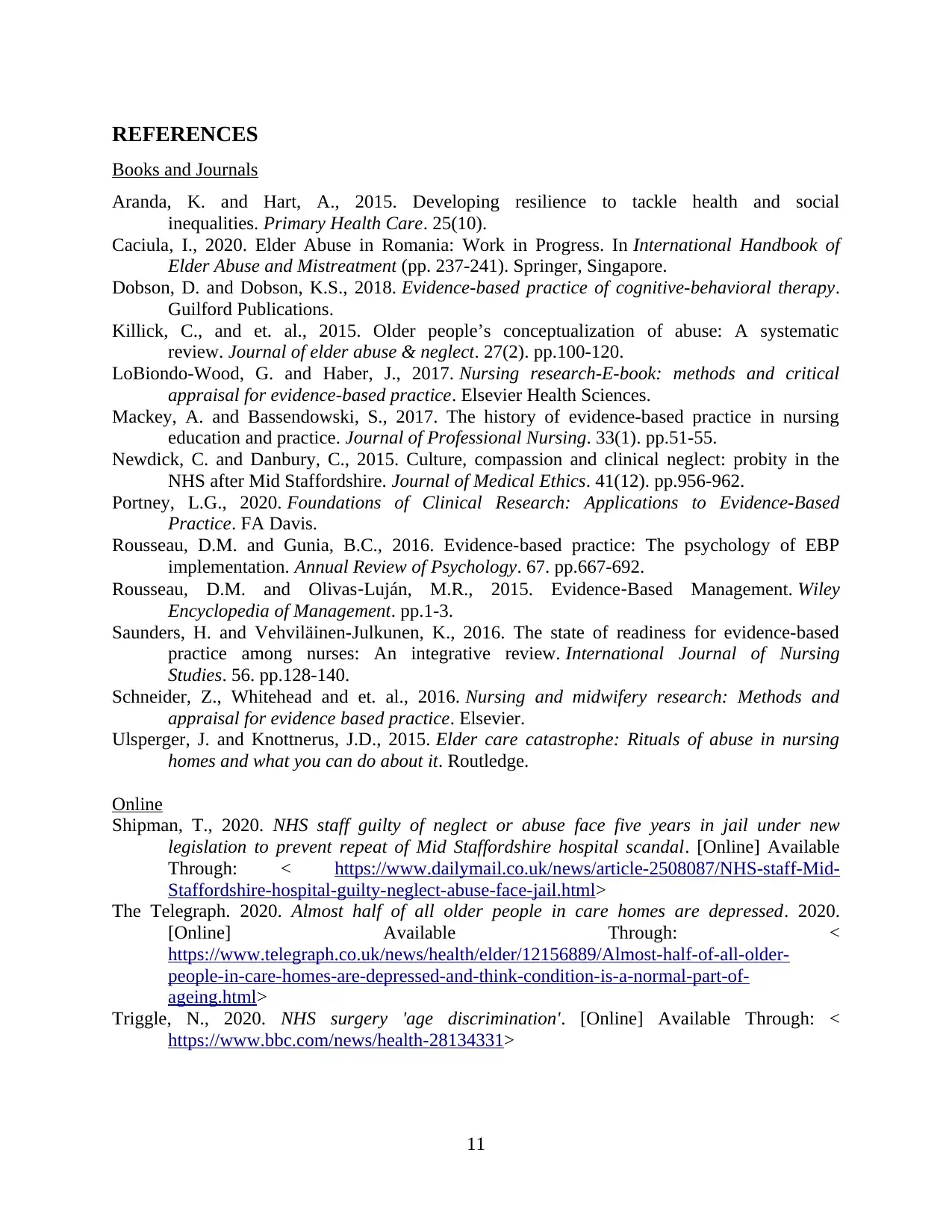
REFERENCES
Books and Journals
Aranda, K. and Hart, A., 2015. Developing resilience to tackle health and social
inequalities. Primary Health Care. 25(10).
Caciula, I., 2020. Elder Abuse in Romania: Work in Progress. In International Handbook of
Elder Abuse and Mistreatment (pp. 237-241). Springer, Singapore.
Dobson, D. and Dobson, K.S., 2018. Evidence-based practice of cognitive-behavioral therapy.
Guilford Publications.
Killick, C., and et. al., 2015. Older people’s conceptualization of abuse: A systematic
review. Journal of elder abuse & neglect. 27(2). pp.100-120.
LoBiondo-Wood, G. and Haber, J., 2017. Nursing research-E-book: methods and critical
appraisal for evidence-based practice. Elsevier Health Sciences.
Mackey, A. and Bassendowski, S., 2017. The history of evidence-based practice in nursing
education and practice. Journal of Professional Nursing. 33(1). pp.51-55.
Newdick, C. and Danbury, C., 2015. Culture, compassion and clinical neglect: probity in the
NHS after Mid Staffordshire. Journal of Medical Ethics. 41(12). pp.956-962.
Portney, L.G., 2020. Foundations of Clinical Research: Applications to Evidence-Based
Practice. FA Davis.
Rousseau, D.M. and Gunia, B.C., 2016. Evidence-based practice: The psychology of EBP
implementation. Annual Review of Psychology. 67. pp.667-692.
Rousseau, D.M. and Olivas‐Luján, M.R., 2015. Evidence‐Based Management. Wiley
Encyclopedia of Management. pp.1-3.
Saunders, H. and Vehviläinen-Julkunen, K., 2016. The state of readiness for evidence-based
practice among nurses: An integrative review. International Journal of Nursing
Studies. 56. pp.128-140.
Schneider, Z., Whitehead and et. al., 2016. Nursing and midwifery research: Methods and
appraisal for evidence based practice. Elsevier.
Ulsperger, J. and Knottnerus, J.D., 2015. Elder care catastrophe: Rituals of abuse in nursing
homes and what you can do about it. Routledge.
Online
Shipman, T., 2020. NHS staff guilty of neglect or abuse face five years in jail under new
legislation to prevent repeat of Mid Staffordshire hospital scandal. [Online] Available
Through: < https://www.dailymail.co.uk/news/article-2508087/NHS-staff-Mid-
Staffordshire-hospital-guilty-neglect-abuse-face-jail.html>
The Telegraph. 2020. Almost half of all older people in care homes are depressed. 2020.
[Online] Available Through: <
https://www.telegraph.co.uk/news/health/elder/12156889/Almost-half-of-all-older-
people-in-care-homes-are-depressed-and-think-condition-is-a-normal-part-of-
ageing.html>
Triggle, N., 2020. NHS surgery 'age discrimination'. [Online] Available Through: <
https://www.bbc.com/news/health-28134331>
11
Books and Journals
Aranda, K. and Hart, A., 2015. Developing resilience to tackle health and social
inequalities. Primary Health Care. 25(10).
Caciula, I., 2020. Elder Abuse in Romania: Work in Progress. In International Handbook of
Elder Abuse and Mistreatment (pp. 237-241). Springer, Singapore.
Dobson, D. and Dobson, K.S., 2018. Evidence-based practice of cognitive-behavioral therapy.
Guilford Publications.
Killick, C., and et. al., 2015. Older people’s conceptualization of abuse: A systematic
review. Journal of elder abuse & neglect. 27(2). pp.100-120.
LoBiondo-Wood, G. and Haber, J., 2017. Nursing research-E-book: methods and critical
appraisal for evidence-based practice. Elsevier Health Sciences.
Mackey, A. and Bassendowski, S., 2017. The history of evidence-based practice in nursing
education and practice. Journal of Professional Nursing. 33(1). pp.51-55.
Newdick, C. and Danbury, C., 2015. Culture, compassion and clinical neglect: probity in the
NHS after Mid Staffordshire. Journal of Medical Ethics. 41(12). pp.956-962.
Portney, L.G., 2020. Foundations of Clinical Research: Applications to Evidence-Based
Practice. FA Davis.
Rousseau, D.M. and Gunia, B.C., 2016. Evidence-based practice: The psychology of EBP
implementation. Annual Review of Psychology. 67. pp.667-692.
Rousseau, D.M. and Olivas‐Luján, M.R., 2015. Evidence‐Based Management. Wiley
Encyclopedia of Management. pp.1-3.
Saunders, H. and Vehviläinen-Julkunen, K., 2016. The state of readiness for evidence-based
practice among nurses: An integrative review. International Journal of Nursing
Studies. 56. pp.128-140.
Schneider, Z., Whitehead and et. al., 2016. Nursing and midwifery research: Methods and
appraisal for evidence based practice. Elsevier.
Ulsperger, J. and Knottnerus, J.D., 2015. Elder care catastrophe: Rituals of abuse in nursing
homes and what you can do about it. Routledge.
Online
Shipman, T., 2020. NHS staff guilty of neglect or abuse face five years in jail under new
legislation to prevent repeat of Mid Staffordshire hospital scandal. [Online] Available
Through: < https://www.dailymail.co.uk/news/article-2508087/NHS-staff-Mid-
Staffordshire-hospital-guilty-neglect-abuse-face-jail.html>
The Telegraph. 2020. Almost half of all older people in care homes are depressed. 2020.
[Online] Available Through: <
https://www.telegraph.co.uk/news/health/elder/12156889/Almost-half-of-all-older-
people-in-care-homes-are-depressed-and-think-condition-is-a-normal-part-of-
ageing.html>
Triggle, N., 2020. NHS surgery 'age discrimination'. [Online] Available Through: <
https://www.bbc.com/news/health-28134331>
11
1 out of 13
Related Documents
Your All-in-One AI-Powered Toolkit for Academic Success.
+13062052269
info@desklib.com
Available 24*7 on WhatsApp / Email
![[object Object]](/_next/static/media/star-bottom.7253800d.svg)
Unlock your academic potential
© 2024 | Zucol Services PVT LTD | All rights reserved.





